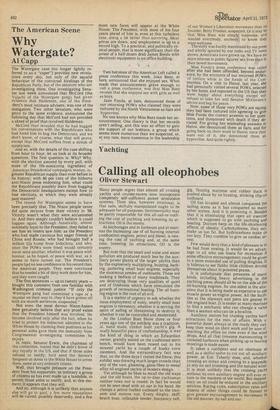Yachting
Calling all oleophobes
Oliver Stewart
Many people regret that almost all cruising yachts and cruiser-racers now incorporate completely self-sufficient power propulsion systems. Their idea, however irrational, is that sails, skilfully manipulated ought to be adequate for all purposes. Sentimentality may be partly responsible for this all-sail-or-nothing the cost of yachting and lowering its attractions. Oil is the enemy.
At anchorages and in harbours and at marinas the increasing use of oil burning internal combustion engines, petrol and diesel, is raising the cost of yachting and, at the same time, lowering its attractions. Oil is the enemy.
But note that the smell and noise and water pollution are produced much less by the auxiliary power plants of the larger yachts than by the explosively multiplying, buzzing, barking, puttering small boat engines, especially the enormous armies of outboards. These are making a bedlam of many roadsteads. They are destroying those very qualities of quiet and of freshness which have stimulated the growth of recreational boating. The oil burning engine is the root of all evil.
It is a matter of urgency to ask whether the mass employment of noisy, smelly small boat engines is necessary; whether it is serving the sport of sailing or threatening to destroy it; whether it can be controlled and moderated.
At the London Boat Show three or four years ago one of the exhibits was a traditional, hand made, clinker built yacht's gig. A really beautiful piece of craftsmanship, it was' the kind of thing in which an Edwardian owner, grandly seated on the cushioned stern bench, would have been rowed out to his moored yacht by a couple of husky crew members. And the extraordinary fact was that, on the three days I visited the Show, this exhibit was drawing much larger crowds than any of the vast, gleaming, glass fibre or metal alloy oil-engined yachts of modern design.
Yet although he likes to recall the old ways and the old boats, the up-to-date yachtsman neither rows nor is rowed. In fact he would not be seen dead with an oar in his hand. He clamps a petrol fuelled outboard to the transom and motors out. Every dinghy, skiff, beach boat, inflatable tender, buoyancy raft, gig, floating mattress and rubber duck iS pushed about by its buzzing, stinking clip-on outboard.
Oil has invaded and almost conquered the sailing .scene as it has conquered so manY other scenes. And it is poisoning it. Besides that it is eliminating that open air exercise which is supposed to go with yachting and boating. Doctors harp on the life-shortening effects of obesity. Carbohydrates, they say. make us too fat. But hydrocarbons make us too lazy. They combine to give us cardiac arrest.
Few would deny that a kind of pleasure is to be had from rowing. It would be an advantage to all who use boats for recreation if some effective encouragement could be given to a more extended use of pulling dinghies. It is hideous to see flabby little children driving themselves about in powered prams. It is unfortunate that pressures of manY kinds, including heavy advertising in the yachting press, should all be on the side of the oil-burning engines. So one-sided is the situation that it is being made as expensive to use muscle power as engine power. All the facili• ties at the slipways and piers are geared to the engined boat. It is easier at many marinas to find a mechanic who can change a valve than a seaman who can tie a bowline.
Auxiliary motors for cruising yachts have attractions for the men of affairs. With a powerful diesel always at the ready they can keep their mind on their work and be sure of reaching the office on time even if the wind drops. And all that tiresome manoeuvring in crowded harbours when picking up or leaving moorings is made easier.
It takes a confident and an obstinate as well as a skilful sailor to cut out all auxiliary
power, as Eric Tabarly does, and, whether
crossing an ocean and coming to a quayside, to rely on sail trimming and the natural wind. It is most unlikely that the cruising yacht without its own auxiliary engine will ever return to the markets ot the world. But dependI ency on oil could be reduced in the ancillary , services. Racing rules, subscription rates and I dozens of other things could be framed to give greater encouragement to movement in the old manner, by sail and oar.


































 Previous page
Previous page